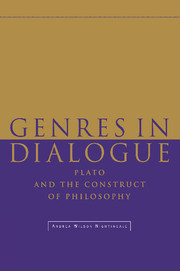Book contents
- Frontmatter
- Contents
- Acknowledgments
- Abbreviations and texts
- Introduction
- 1 Plato, Isocrates, and the property of philosophy
- 2 Use and abuse of Athenian tragedy
- 3 Eulogy, irony, parody
- 4 Alien and authentic discourse
- 5 Philosophy and comedy
- Conclusion
- Bibliography
- General index
- Index of passages from Plato
3 - Eulogy, irony, parody
Published online by Cambridge University Press: 23 October 2009
- Frontmatter
- Contents
- Acknowledgments
- Abbreviations and texts
- Introduction
- 1 Plato, Isocrates, and the property of philosophy
- 2 Use and abuse of Athenian tragedy
- 3 Eulogy, irony, parody
- 4 Alien and authentic discourse
- 5 Philosophy and comedy
- Conclusion
- Bibliography
- General index
- Index of passages from Plato
Summary
There is nothing either precise or calibrated about praise and censure.
Cervantes, Prologue to Novelas ejemplaresI would rather err on the side of praising the undeserving than castigating where blame is due. Unmerited praise passes for ingenuousness on the part of the giver, but if you paint in his true colours someone whose conduct calls for nothing but censure, this is attributed to your own sick judgement and not to his deserts.
Erasmus, Letter to Martin DorpBy setting philosophy in opposition to poetry, Plato was able to distinguish his version of wisdom and the wise man from those of the poetic tradition. But an equally menacing opponent presented itself in the form of rhetoric – a mode of discourse whose difference from “philosophy” was far more difficult to mark. Plato, of course, went to great lengths to differentiate philosophical from rhetorical discourse. But he did not simply attack the “art of rhetoric” as a whole: as a cultural critic, he was acutely aware of the ways in which different genres of rhetoric reflected and reinforced Athenian ideology. While Plato was clearly concerned with rhetoric in all its aspects, there was one genre that he found especially pernicious: the rhetoric of praise. This kind of rhetoric was a beast with many heads. It found its way into many different genres of discourse and was offered up to disparate audiences in a number of different performative contexts. It was thus much more difficult to target than the deliberative rhetoric of the assembly and the forensic rhetoric of the lawcourts, which had a distinct form, purpose, and context of performance.
- Type
- Chapter
- Information
- Genres in DialoguePlato and the Construct of Philosophy, pp. 93 - 132Publisher: Cambridge University PressPrint publication year: 1995
- 2
- Cited by

